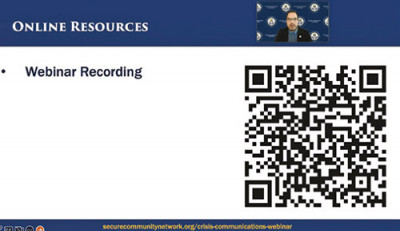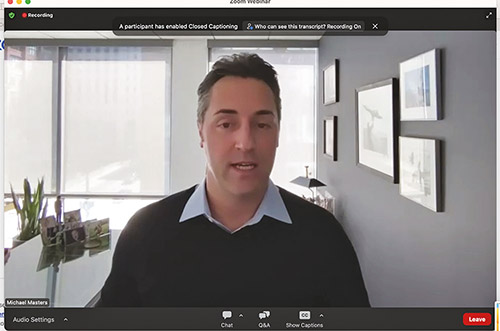
In our “new normal” of constant security consciousness and hyper vigilance, one persistent mantra is that it is always worthwhile to plan ahead.
As a Secure Community Network webinar on March 27 made clear, this philosophy also extends to thinking ahead about how your shul, school or organization will speak with the media in the heat of a crisis.
Introducing the program, SCN Executive Director Michael Masters said that, as he’s learned: “According to law enforcement leaders, you never ‘rise to the occasion’ but rather, you fall back on your level of training.” He added that it’s never a good idea to meet a partner agency during a crisis. For those reasons, SCN was happy to hold this webinar to encourage security leaders to plan ahead for different aspects of a potential crisis and to build ties with local law enforcement.
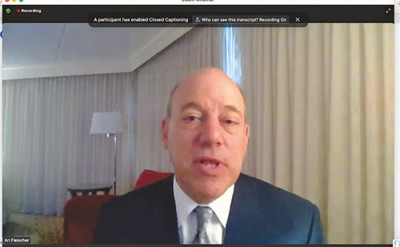
Masters introduced the guest speaker, Ari Fleischer, who served as press secretary for the Bush/Cheney campaign and as press secretary for President George W. Bush for two years, during the 9/11 attacks and their aftermath and through the anthrax crisis. Fleischer offered a rubric to help organizations and institutions plan to face the media in the midst of a crisis, built around the letters T-H-R-D-D:
T is for Truth, as a spokesperson should share only verifiable facts and not any embellishments. Otherwise, their credibility is severely undermined.
H is for doing your Homework, thinking through who will speak to the press, what they should say, and what they shouldn’t say. Never come before the press before you are prepared.
R is for Reporter, as an organization needs to think like one and consider what questions the reporters will ask. He suggested that each group have someone at the table, in a planning session, who can suggest the hard questions they’ll be asked. As an illustration, Fleischer shared a video of an FBI briefing after the Colleyville hostage crisis, where the spokesman addressed 11 questions in three minutes or one every 16.4 seconds. He pointed out that with some questions, it may not be appropriate to answer them at the time.
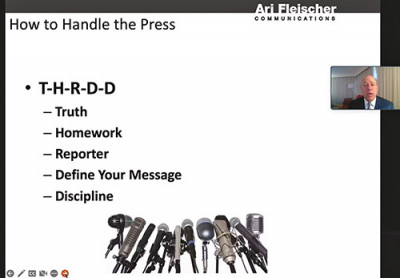
D is for Define Your Message. He suggested that each organization consider: What is the news story headline you’d like to see in the media the next day? They should design talking points based on that headline and plan to articulate that framework repeatedly, to give it traction.
The second D is for Discipline. The spokesperson must keep their focus and not try to be accommodating to press representatives. They must stick to what they know and follow the homework their team did.
Following Fleisher’s presentation, Masters introduced Matthew Berger, executive director of the Foundation to Combat Antisemitism—an advocacy and coalition-building organization, founded by philanthropist Robert Kraft, with a mission “to win the hearts and minds of non-Jews and Jews through powerful positive messaging and partnerships, motivating and equipping them to be defenders of and upstanders for Jews.” Berger spoke about the new $25 million Blue Square national media campaign, launched the day of the webinar, which is designed to highlight the pervasiveness of antisemitism in the U.S. and provide opportunities for allies to show support to the Jewish community. For more information on the campaign, see the foundation’s website, https://www.fcas.org.
Craig Fifer, communications director of SCN, then introduced a panel of three Jewish leaders from major Jewish communities with experience in crisis communications—Mariam Feist, CEO of the Jewish Federation and Foundation in Jacksonville, Florida; Taryn Baranowski, VP of the Jewish Federation of Houston; and Adam Hertzman, associate VP and marketing director of the Jewish Federation in Pittsburgh.
Feist stated that forming a crisis response team is a vital step and that collaborating with local law enforcement, before any crisis emerges, is essential. She urged viewers to “build alliances in advance and convene them regularly.” When addressing the press, she said that it is important to talk about what you do know and to think ahead about what questions you do not want to answer.
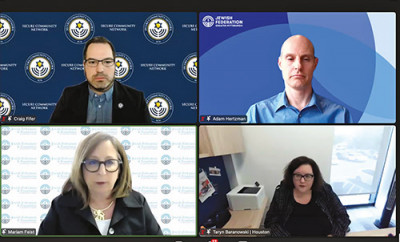
Baranowski pointed out that each crisis is unique and it pays to think through each one separately, to determine what are the critical aspects that your members and the general public should know. She advised that in any contingency planning, leaders must “put people first” and think of the human toll of a crisis. She also stressed the value of making sure that everyone on the crisis response team is on the same page.
Hertzman asked rhetorically: “Why do you need to talk to the press in a crisis?” He responded, “Because people want to see leaders out there, offering reassuring messages.” He recommended that spokespeople prepare themselves to repeat their core messages a lot, on the assumption that most viewers won’t hear it as often as the speaker does. The viewers will likely only hear the message a couple of times, and it can sink it better with a few repetitions.
By Harry Glazer
